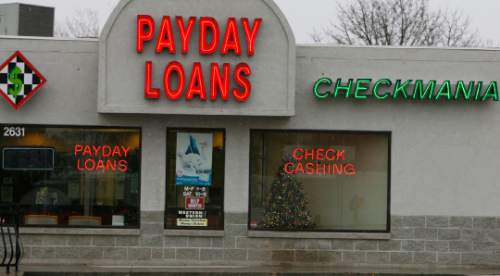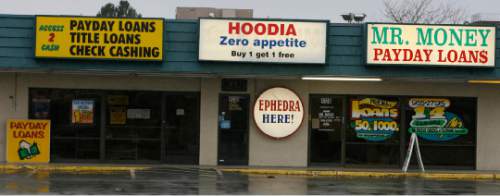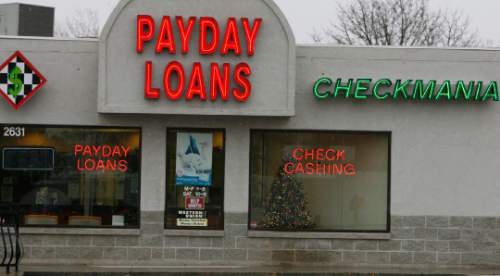This is an archived article that was published on sltrib.com in 2015, and information in the article may be outdated. It is provided only for personal research purposes and may not be reprinted.
The payday loan industry insists that the vast majority of its customers can afford the high-interest loans. But last year, 45,655 Utahns — roughly the population of Bountiful — could not pay off those loans in the 10 weeks that they can be extended.
"That's pretty bad," says Rep. Brad Daw, R-Orem, an outspoken critic of such loans. "I think it obviously belies the industry's claims" that its loans are not a "debt trap" where borrowers often take out more loans to pay off earlier ones.
Those facts were collected by the state Department of Financial Institutions and released last week because of 2014 reform passed after investigators said payday lenders were involved in scandals leading up to the resignation of former Attorney General John Swallow — including $100,000 in donations funneled through him to help defeat Daw in 2012 (who later made a comeback).
For the first time, the state required payday lenders to report how many customers failed to pay off their loans in the 10 weeks that they can be "rolled over" after an initial two-week term. Those outstanding loans totaled $17.9 million.
Lenders also reported (as part of types of data collected previously) that payday loans in Utah now average 482 percent annual interest, about $9.24 in interest per week on a $100 loan, up from 466 percent APR last year.
The lowest rate charged by any lender during the year was 0 percent, probably as part of a promotion. The highest was a whopping 1,564 percent APR, or $30 a week on a $100 loan.
The average payday loan in Utah now is $334. While loans usually are made for two weeks, data say the average number of days needed to pay off the loans is 29. Utah law limits charging interest on those loans for more than 10 weeks, although critics say borrowers are urged to take out new loans to pay off old ones.
Lenders are not required to report how many overall loans they made. Without that data, it is impossible to figure out the overall default rate.
"I think we ought to know how many people are getting payday loans. Not knowing the default rate is really weird," Daw said, adding that he may consider legislation to require such disclosure.
The new numbers suggest that default rates may be high, Daw said, perhaps up to a third of all payday loans.
A study by the Pew Charitable Trusts estimated that 12 million payday loans are made a year, equal to about 4 percent of the U.S. population. If similar rates hold true in Utah, Daw noted, the default rate would be about 30 percent considering the reported number of loans outstanding after 10 weeks.
Wendy Gibson, spokeswoman for the Utah Consumer Lending Association of payday lenders, disputes that analysis. "The vast majority of customers can afford to repay their loan within the arranged time frame," she said.
Daw has proposed multiple times — including unsuccessfully earlier this year — a bill to require payday lenders to create a database of all their loans, and limit to two the number a borrower could have at any time. The idea would be to attempt to stop people from taking out one loan to pay off another in a spiraling "debt trap."
States that have such a restriction report default rates of about 1 percent, Daw said.
Payday lenders oppose the idea, saying Utah law already requires the industry to analyze whether a borrower has the ability to repay a loan. "A database that only looks at the number of payday loans [a borrower has] cripples the ability to make a determination of whether a borrower can repay," said Gibson, the industry spokeswoman.
House Majority Leader Jim Dunnigan, R-Taylorsville, who passed the recent legislation requiring extra reporting, said finding that 45,000 people last year did not pay off loans in 10 weeks shows that the other reform, putting a 10-week cap on accruing interest and fees, was sorely needed.
"After 10 weeks if the loan is still not repaid, borrowers [now] can have an interest- and fee-free period to pay it down," he said. "As long as they stay current on their payments in that period, they cannot be taken to court and they can't be charged additional [interest or] fees."
Gibson said the numbers indeed show "that the extended, interest-free payment plan offered at the end of 10 weeks is being utilized by customers who are taking advantage of the strong consumer safeguards in place in Utah, and who have numerous options to pay back their short-term loan."
Dunnigan, who sponsored the extra reporting reform last year after leading the House investigation into Swallow, said he does not plan to sponsor additional payday loan legislation.







